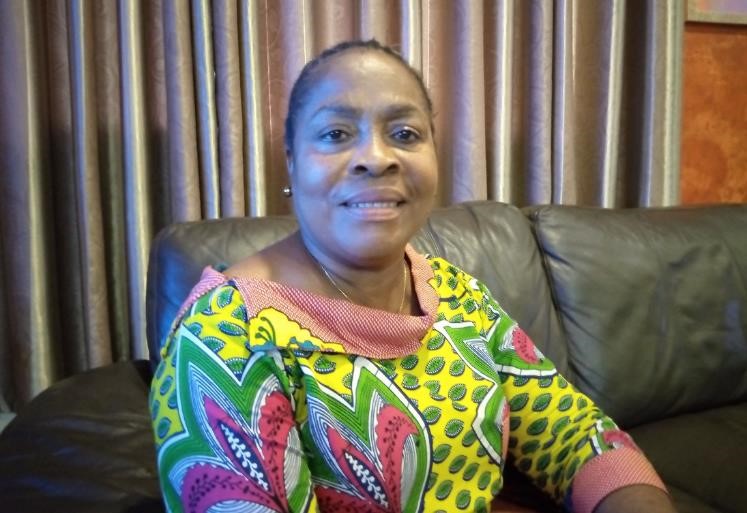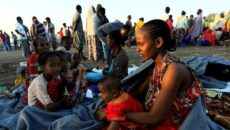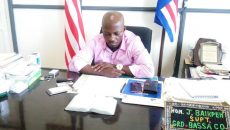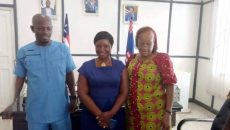BUCHANAN, Grand Bassa – Women in Liberia gained their right to vote and participate in politics between 1943 and 1955 through constitutional changes, but the active participation of women in politics remains a challenge today. Very few feel compelled to run for elected positions traditionally held by men, due to either financial constraints, cultural views, or a combination of those.
According to a study by the National Elections Commission released in 2017, 253 female candidates contested for elected positions between 2005 and 2015 in 2 general elections, 14 by-elections, and 1 special senatorial election. Montserrado had the highest number of women candidates with 87 representing 34.4 percent, followed by Bong with 26 (representing 10.3 percent). Bomi had 14 female candidates, Nimba and Lofa with 17 each, and Grand Bassa and Grand Cape Mount with 12 each.
Of the 253, 5 targeted the presidency, 4 aimed for the vice presidency, 61 ran for Senate, and 183 ran for the House of Representatives. Only 30 were successful, equivalent to an 11.9 percent success rate.
There were 1,054 candidates in the 2017 general and presidential elections, of which 162 were women.
The 2020 Special Senatorial Elections also saw 20 women contest, compared to 118 male candidates.
The deputy minister of gender at the Ministry of Gender Children and Social Protection, Alice Johnson-Howard, believes that despite the disappointing numbers, women can and should make a difference by being determined to run for elections, supporting each other, and closing the gender gap.
Over the years, women have kept themselves in the back and pushed men in front due to cultural and traditional norms, she said, but this mentality has got to change.
Women must support women
“Women, if we want equal representation, we need to find our space. We can’t get it on a silver platter. We must fight for it, we must put everything we have into it, to make sure that we get to where we want,” Johnson-Howard told The Bush Chicken.
However much society would like to blame men for limiting the ambitions of women, the deputy gender minister believes that women also play an important role because they should be more driven to challenge the male status quo.
“The low number of [women’s] participation is that women themselves have not been pushing forward,” she said. “Women need to stand up. Women themselves should be able to support women in the political venture because you don’t see a lot of women supporting women.”
Speaking about financial difficulties facing female candidates, Howard explained that this is a challenge faced by all candidates, regardless of their gender, and should not be an excuse.
Solomon Kollie, chairperson of the Collaborating Political Parties in Grand Bassa, said women must not give up on the fight. Kollie’s party was the only one fielding candidates in a majority of counties during the 2020 Special Senatorial Elections that met the legal recommendation of not having fewer than 30 percent of candidates be from one gender. Five of the fifteen CPP candidates running (33.3 percent) were women.
“We’ve lived in a male-dominated society from the inception of our country’s history. Since the late 50s, before women had an opportunity to participate in the electoral process, that has dragged on up to the current situation,” Kollie said.
“In those days, women were house helpers. In fact, for them to go to school was difficult. It is only now that you see many female enrollments in education. Many girls are taking up the challenge to go to school to equip themselves academically now, so women need to push forward to change the history.”

Chairman of the Collaborating Political Parties in Grand Bassa, Solomon Kollie. Photo: Sampson David
Kollie believed that social and cultural barriers, lack of adequate financial support, and limited political will are holding back women from entering the political arena.
He added, “The breadwinners have normally been the men, and there are more men who are capacitated when compared to women, but I think women are making a lot more effort today. They are now making moves to occupy major decision-making positions such as in the presidency, vice presidency, senators, and even representatives.”
Politics too threatening to women’s security
Kollie said the current legal framework is discriminatory toward women. He also added that women are often threatened by their male counterparts, giving the example of the lone female senatorial candidate in Gbarpolu who had been threatened by traditional leaders and their supporters with witchcraft and violence.
“Politics in our country is rough, rude, and chaotic. So, to see a mother leaving her home to contest is difficult,” Kollie said.
“Women are in the majority [as voters], so if they decide to support their kind, they will win more of the seats, but people are not going by the gender, the electorates are going for the best that they think can represent them in the Legislature.”
Julia Duncan Cassell, a former gender minister and lead advocate for women’s participation in politics, said women must invest more effort in the political effort and prepare themselves ahead of time to have a fair chance against male candidates.
“We fought for gender equality – we are still fighting for more women to occupy major decision-making positions in our country to push women’s agenda,” she said. “Look, what women can see sometimes men can’t see it. We can do better. How will you feel about having a Legislature with just one or two females? Their advocacy might just be looked down upon, but if you have more women, it will be better.”
Female candidates must work hard well ahead of elections
She tells women not to see politics as a men’s career only, but as a career that belongs to everyone, regardless of their gender. She also called on women to join a recently organized group under the banner “Women Can Lead” to make a difference in occupying leadership roles in the country.
“Women need to come out, women need to prepare themselves ahead of every electoral process as the men usually do, and let us support each other in the elections,” she said.
The former gender minister also suggested that social, cultural, and financial barriers are holding back more women from participating in politics, but these are barriers that can be overcome. The biggest challenge to women’s success in politics is culture, she said.
Duncan Cassell added, “When I contested as representative in 2017 and did not win, a [traditional] chief called me and said, ‘Do you know why you didn’t win?’ And I said no. He said, ‘Because you are not a real woman yet.’ That is what he said. So, his belief of being a real woman is to be a part of the tradition or culture.”
She continued, “We need to see politics as an exchange of ideas and I think women have brilliant ideas that can bring development, bring change, and promote peace and justice. When we talk about gender equality, it should be everywhere in our society. Even in the Executive as well as the Legislature. We should not just say ‘gender equality’ and that is all to it, but it should be real, we should practice it, and women should also make efforts toward it.”
The New Elections Law requires political parties to “endeavor” to ensure that at least 30 percent of their candidates are of either gender. During the 2017 elections, only 15.9 percent of the total number of candidates in the elections were females and no party met the 30 percent requirement. However, the National Elections Commission did not penalize the parties because the law does not mandate gender equality.
Magdalene Harris, who ran for a senatorial position in Grand Bassa, but lost, said that participating in African politics and raising financial support is a challenge because people believe that the candidate must pay 100 percent of their elections expense and also give money to voters. The idea of campaign donations does not exist.

Grand Bassa senatorial candidate Magdalene Harris. Photo: Sampson David
“If you finance people’s personal life and, at the same time finance the [election] campaign, then they believe you are the best. We need to erase that. If we can change that belief and look at people’s qualifications and the value they bring to the process, then we will elect the best people. Women can make the difference, we are qualified, we are challenged,” Harris said.
The United Nations Sustainable Development Goals pillar five under the Gender Equality and Women’s Empowerment speaks of providing an enabling environment for equal participation of women in politics as well. It also notes that gender inequalities are still deeply rooted in every society around the world. However, Liberia has much progress to catch up with.
Harris believes that gender equality in Liberia could be fully be realized if the financial, social, and cultural barriers are removed – a task easier said than done.
Featured photo by Sampson David



